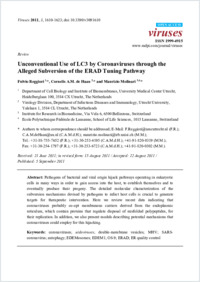Unconventional use of LC3 by coronaviruses through the alleged subversion of the ERAD tuning pathway
- Reggiori, Fulvio Department of Cell Biology and Institute of Biomembranes, University Medical Center Utrecht, Heidelberglaan 100, 3584 CX Utrecht, The Netherlands
- De Haan, Cornelis A.M. Virology Division, Department of Infectious Diseases and Immunology, Utrecht University, Yalelaan 1, 3584 CL Utrecht, The Netherlands
- Molinari, Maurizio Institute for Research in Biomedicine (IRB), Faculty of Biomedical Sciences, Università della Svizzera italiana, Switzerland - Ecole Polytechnique Fédérale de Lausanne, School of Life Sciences, 1015 Lausanne, Switzerland
-
05.09.2011
Published in:
- Viruses. - 2011, vol. 3, no. 9, p. 1610-1623
Coronaviruses
Nidoviruses
Double-membrane vesicles
MHV
SARS-coronavirus
Autophagy
EDEMosomes
EDEM1
OS-9
ERAD
ER quality control
English
Pathogens of bacterial and viral origin hijack pathways operating in eukaryotic cells in many ways in order to gain access into the host, to establish themselves and to eventually produce their progeny. The detailed molecular characterization of the subversion mechanisms devised by pathogens to infect host cells is crucial to generate targets for therapeutic intervention. Here we review recent data indicating that coronaviruses probably co-opt membranous carriers derived from the endoplasmic reticulum, which contain proteins that regulate disposal of misfolded polypeptides, for their replication. In addition, we also present models describing potential mechanisms that coronaviruses could employ for this hijacking.
- Language
-
- English
- Classification
- Medicine
- License
- Open access status
- gold
- Identifiers
-
- RERO DOC 326642
- DOI 10.3390/v3091610
- ARK ark:/12658/srd1318948
- Persistent URL
- https://n2t.net/ark:/12658/srd1318948
Statistics
Document views: 211
File downloads:
- Texte intégral: 176
